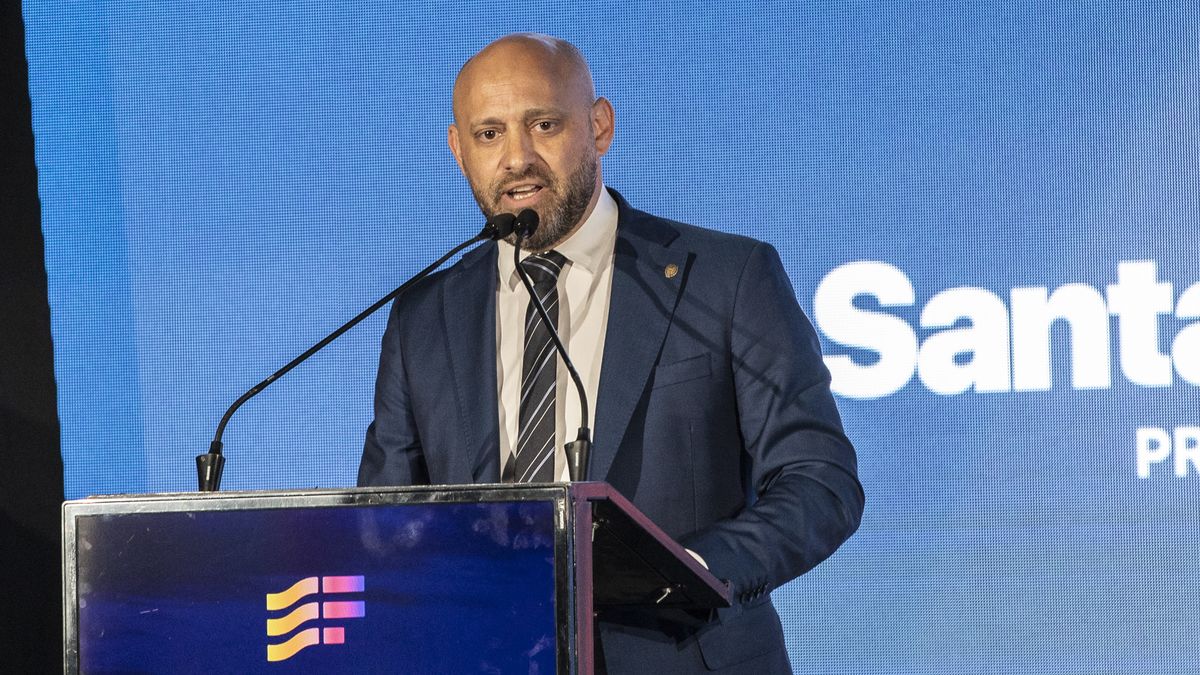In this context, Puccini dared to ask: “It would seem that rock bottom has already been hit. And I say this very cautiously. Some slight or small recovery was seenperhaps due to some quota measure that the government was implementing with the banks.”
Journalist: How much do you think this Forum contributes to the export performance of local companies?
Gustavo Puccini: Activities like this forum encourage many companies to export to the foreign market. 750 companies export here, but there are others that don’t because they don’t dare or are hesitant about prices. There are important niches, from honey to rice. There are other companies that are in the metalworking industry and are good companies, but they don’t export either. And we are trying to provide a lot of support with six-month assistance to companies to advise them.
We are pleased that companies from all departments of the province of Santa Fe came, even from less industrialized districts such as San Javier, Garay, San Cristóbal and 9 de Julio. These are regions with less industrial density and they came to the forum.
That is why I consider this to be a concrete example of public-private coordination, because the call was made to the mayor, the communal president, the legislator, but also to the companies.
Q: Are there requests from companies for the State to facilitate exports?
GP: As for the demands of companies to the public sector, there are different cases. One is that beyond the quality of a product, everything is largely defined by the issue of prices. And that is where competitiveness, cost and exchange rate come into play. And questions arise.
There were also problems with importing some inputs before. And then comes the issue of the cost of importing. Then companies ask you for the typical measure that you always hear: we would like predictability.
The national government is doing some work on these issues, but we have to see how it is going to affect the real world, on a day-to-day basis. It was resolving many bureaucratic obstacles, many obstacles to imports, especially in inputs. These complaints were heard,
Q: And is there compliance from the companies?
GP: I think that for many SMEs, and more so in this context of two or three months, some solutions have appeared. For example, with the reduction of the country tax, each SME analyses how that fits into what it was already quoting; especially for those that want to enter the market, because those that are already there often tell you themselves, we continue exporting even if it is not convenient for us, but I cannot lose markets. Whoever leaves does not enter anymore. It seems to me that what the national government is doing with the macro is more decisive than what we can help companies with.
Q: And how does the province support you?
GP: In this regard, we can provide credit lines to improve facilities or capital in goods to produce better. And everything that is training and formation with a very strong program in that, which is Impulsa.
It is important that all educational offerings be linked to production in the province. We have concrete examples that this was disjointed in our province. In Villa Cañás, the main company that hires labor to manufacture carts had to go to Venado Tuerto to find welders. Every day they had to go back and forth in a trafic. A year ago that cost them 500 thousand pesos per week. That is an expense that goes into the cost of production. We solved that with the Impulsa program. We changed the curriculum of the technical school so that it could train welders in Villas Cañás.
We are working on rural electrification, productive roads, we had $8 billion and we put another $4 billion into rural infrastructure, electric power, and now we are announcing the gas pipelines, which are six that reach different places in the province that are not reached by gas. For the productive world, this is a change in the matrix that changes the cost.
Q: Do you see any concern among companies about opening up imports?
GP: Our industries are always very concerned in a context in which we know that there is no protectionist government as there was before, with the practice of closing the economy and locking down. That is no longer the case.
We have always said it. If there is any opening, we want it to find our industries in a different position. It is not the situation of the 1990s. You do not find them in debt, nor lacking technology to ensure competitive processes. At least the companies in Santa Fe are financially sound and their production processes are quite competitive.
In the face of some opening measures, we have not yet had to suffer direct negative effects or those that are immediately warning us. And many measures seem to have been more alarmist announcements than concrete actions.
Q: How are you acting in response to that?
GP: We analyze each measure together with the productive sector and we try to interpret what the national government is trying to do with this and then measure the real impact it can have.
Santa Fe also has a very diverse production profile that is different from other provinces. From the sectors that were hit the hardest in the last six months, such as wood, furniture, footwear, clothing and food. Also the white goods industry.
But there are other sectors that are a little bit removed from this, that have dealt with the situation in a different way. There are 300 companies that provide services to the mining sector and that are at another level. And the agricultural machinery sector has recovered a little momentum since the Agroactiva exhibition. And many metalworking companies are turning their activity from agriculture to mining and gas issues. The automotive sector is also quite recovered and without suspensions.
Q: What objective data can you show?
GP: These are the objective data. In these eight months we have provided credit lines with different financial institutions for 40 billion pesos. This is a fact, because there is a productive sector that is thinking with other expectations and is taking out loans to invest in capital goods.
Another objective fact is that the suspension levels have dropped in companies that three months ago, like in Rafaela, said they had to suspend due to the drop in sales and now they have resumed their activities. It would seem that the bottom line has already been touched. And I say very cautiously, some slight or small recovery was seen perhaps due to some quota measure that the government was implementing with the banks.
If you talk to many businessmen, they have positive expectations. They say that the government is trying to unblock something. Although there is still concern about imports or where the government wants to go. We have to support our companies a lot with the issue of innovation.
At the business fairs we attend, there is talk of strong investments to come. Last week in Salta, investments in mining for 7 billion dollars were mentioned. And supplying the mining industry up there represents about 6,000 workers every 15 days, plus clothing, food, health. Santa Fe has everything it needs to act on this immediately.
That is why we were perhaps a little more advanced than Córdoba, Entre Ríos, and even Buenos Aires itself. We go to business meetings in Salta for mining and for Vaca Muerta in Neuquén.
Source: Ambito
I am Pierce Boyd, a driven and ambitious professional working in the news industry. I have been writing for 24 Hours Worlds for over five years, specializing in sports section coverage. During my tenure at the publication, I have built an impressive portfolio of articles that has earned me a reputation as an experienced journalist and content creator.




